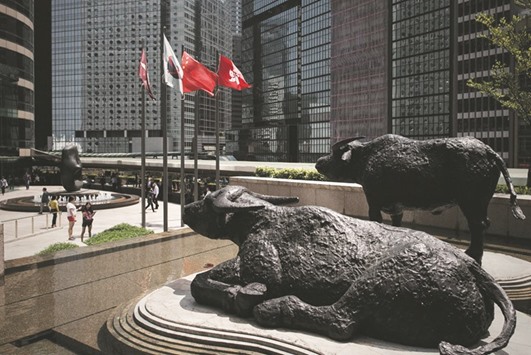China’s investors are piling into Hong Kong equities at the fastest rate in more than a year as they seek shelter against a weakening currency and a worsening economic outlook.
Mainland traders bought a net 21.9bn yuan ($3.3bn) of shares listed on the city’s stock exchange in May, the most since April 2015, according to data compiled by Bloomberg tracking investments via the exchange link with Shanghai. That’s taken net inflows for the year to 46.7bn yuan.
The yuan slumped against the dollar last month by the most since August’s devaluation as economic data trailed estimates and traders boosted bets for the Federal Reserve to raise borrowing costs. Chinese institutional investors, who currently hold less than 1% of their investments in overseas assets, are seeking more offshore opportunities amid bets the yuan will continue to fall, according to UBS Group.
“It is not a short-term phenomenon,” Wenjie Lu, a strategist at UBS in Shanghai, said about China’s appetite for Hong Kong stocks. “The currency depreciation will probably persist for multiple years and the big picture is that Chinese investors currently have very small exposure to overseas assets.”
The yuan traded at 6.58 per dollar in Shanghai, within 0.3% of a five-year low in January, and extending May’s 1.5% retreat. The currency will weaken a further 1.8% to 6.7 through 2016 and fall to 6.95 by 2018, according to median estimates in a Bloomberg survey of strategists.
The Hong Kong dollar is pegged to the greenback.
The city’s benchmark Hang Seng Index climbed 0.5% to its highest level in a month at the close.
Chinese investors are increasingly targeting the biggest companies listed in the former British colony, including banks offering Hong Kong products on the mainland and HSBC Holdings. Large-cap equities represented about 43% of the total southbound trading volume in the four months through April, up from 27% in 2015, according to data from Hong Kong Exchanges & Clearing Ltd
Mainland investors are also drawn by the cheaper valuations, according to Hao Hong, chief China strategist at Bocom International Holdings Co.
The Hang Seng China Enterprises Index trades at 7 times projected earnings for the next 12 months, compared with 12.6 for the Shanghai Composite Index. A gauge of dual-listed shares is 34% more expensive on the mainland than in Hong Kong.
The cross-border flows, while small relative to the record capital exodus from China in 2015, show the challenge policy makers face as they seek to stem outflows by providing attractive investment options at home.
The Shanghai Composite is the world’s worst performer this year, falling 18%, while commodity prices on the nation’s futures markets have slumped as a boom turned sour.
Hong Kong equities aren’t immune to a falling Chinese currency. Because many companies listed in the city derive the bulk of their sales from the mainland, a depreciating yuan reduces the value of their profits when translated back into Hong Kong dollars. The inflows via the link are also small relative to the market’s turnover, which averaged HK$60bn ($7.7bn) a day over the past month.
Accelerating flows into the city from Shanghai have reduced the remaining aggregate quota to about 94bn yuan, down from the 250bn yuan when the program started in November 2014.
That reflects a greater appetite than global asset managers have for Shanghai equities - with 166bn yuan remaining of a 300bn yuan quota - and is spurring speculation officials will soon increase the cap.
Continued depreciation of the yuan and the anticipated expansion of the link to Shenzhen will help shore up Hong Kong’s stock market, according to UBS’s Lu. The Hang Seng Index is still down 4.8% this year, compared with a 0.6% advance by the MSCI All-Country World Index.
“How much money flows from the mainland will drive the performance of the Hong Kong market,” he said.

Bull statues displayed outside the Hong Kong Stock Exchange. China’s investors are piling into Hong Kong equities at the fastest rate in more than a year as they seek shelter against a weakening currency and a worsening economic outlook.
